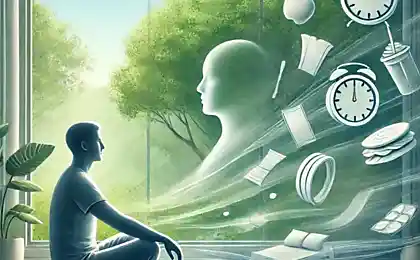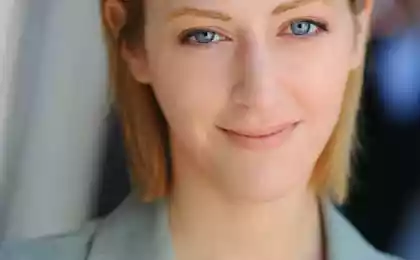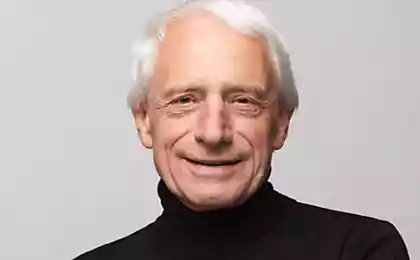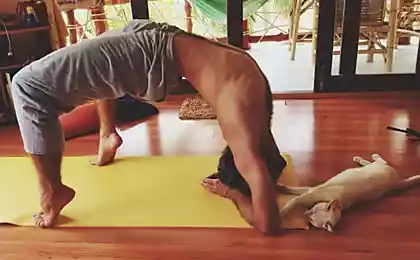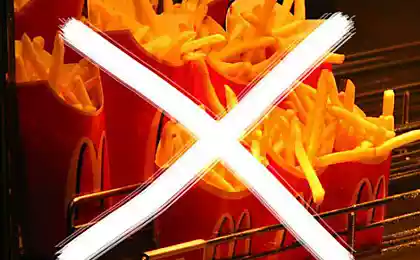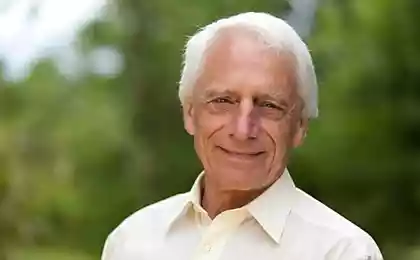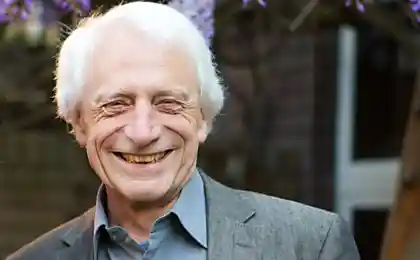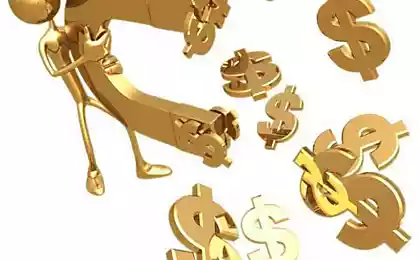713
The Alfred Laengle: Will is something completely my own
Will is my inner "Yes" in relation to some values,the Alfred Laengle, the famous Austrian psychotherapist, Professor, one of the founders of existential analysis, read in the Moscow lecture on the topic"Why I do what I want? Deciding on the method of reinforcement of will".
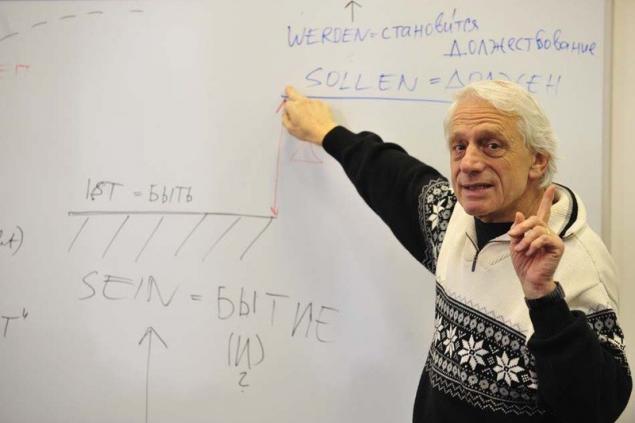
"The theme of the will is the subject that we deal with every day. We don't even leave from this topic. Every person who is here, is here because he wants to be here. No one came here involuntarily. And what would we do during the day, this is due to our will. Do we sleep whether we sleep, whether we're on some conversation, we decide whether a conflict, we do so only if we have decided in favor of this and we have the will to do it.
Maybe we are not even aware of this fact, because we don't say so often "I want" and bring it in such expressions: "I would like", "I would have done". Because the phrase "I want" translates to something very important. And will is really power. If I don't want to do it. No one has the power over me to change my will, only myself. In most cases we don't even realize it, but intuitively we have a sense that this is what this will. So we're talking more softly, "I wish" "I wish" or simply, "I'll go". "I'll go to this report" — this is the solution. To complete this idea, which was a kind of introduction, say:often we don't even realize that every minute you want something.
I would like to divide my report into three parts: in the first part describe the phenomenon of will, the second part to talk about the structure of the will, and in the third part briefly mention the method of reinforcement of will.
I
Will every day present in our life. Who is the one person who wants? It's me. Only I manage will. Will is something completely my own. I identify themselves with the will. If I want something, I know it's me. The will represents the autonomy of a person.
Autonomy means that I set for myself the law. And the will at our disposal is itself a determination, through will I will determine what I will do as the next step. And it already describes the task will. Will is the ability of a person to give himself a job. For example, I want to keep talking.
Thanks will, I release your inner strength for some action. I invest some power and give it time.That is, the will is an instruction to perform an action that I give to myself. In fact, that's all. I give myself the order to do something. And since I want it, I experience myself as free. If any order I give my father or Professor, it is the job of a different kind. Then I already no longer free, if you follow this. Unless I joined their mission to their will and say, "Yes, I'll do it."
In our lives the will has absolutely pragmatic function — to come to action. Will is the bridge between the centre of the team, in me and act. And it is bound to I — because I have only my will.To bring this will into movement is the task of motivation. That is, the will is very closely connected with motivation.
Motivation at its core means nothing, as the Ghost will move. I can motivate your child to homework. If I tell him why it's important, or promise him a chocolate. To motivate means to bring man to what he wanted to do himself. Employee, friend, colleague, child or yourself.How can I self motivate, for example, to prepare for the exam?In principle, the same means, how do I motivate the child. Can think of why this is important. And you can promise yourself a chocolate bar as a reward.
To recap. First, we saw that the will is a job to do something that man gives himself. Secondly, the author will is myself. There is only one my personal will, in me. "Wants" is none other like me. Thirdly, the will is the center of motivation. To motivate means to bring the will into motion.
And it puts the person before finding a solution. We have some hypothesis, and we are faced with the question: "do you Want me or not?". I have to make a decision — because I have freedom. Will is my freedom. If I want something, I am free, I decide, I myself fix something. If I want something myself, I'm not forced, I don't have to.
This is the other pole of will — lack of freedom, forced. To be forced by a greater power — the state, police, professors, parents, a partner who will punish me if anything, or because it may have bad consequences if I don't do something that the other wants. Also, I can cause the psychopathology or mental disorders. This is just a characteristic of mental illness: we can't do what you want. Because I have too much to fear. Because I'm depressed, and I have no power. Because I depend. And then again and again I have to do what you don't want to do. Mental disorders involve a failure to follow his will. I want to get up, to do some business, but I have no desire, so I feel bad, I'm so depressed. I have remorse that I did not get up again. Thus, depressed people can't follow what he thinks is right. Or anxious person can't go to the exam, although wants.
In the will we find the solution and implement our freedom. This means that if I want something, and it's a real will, I have a special feeling — I feel free. I feel like I'm not being forced, and it fits me. It's me again, which itself implements. That is, if I want something, I am not a machine, a robot.
The will is the realization of human freedom. And this freedom is so deep and so personal that we can't get it to give to someone. We cannot stop being free. We need to be free. It's a paradox. This is indicated by existential philosophy. We are free to a certain extent. But we are not free to not want. We should want. We need to make decisions. We have to do something.
If I'm sitting in front of the TV, I'm tired and fall asleep, I have to make a decision whether to continue to sit because I'm tired (this is also a solution). But if I can't make the decision, it also has a solution (I say that now I can not make a decision, and do not take any decision). That is, we make decisions, we always have will. We are always free because we can't stop to be free, as Sartre formulated it.
And because this freedom is located at a great depth, in the depth of our essence, the will is very strong. Where there's a will there's a way. If I really want something I will find a way. People sometimes say: I don't know how I to do something. Then these people have a weak will. They do not truly want. If you really want something, go thousands of kilometers and becomes the founder of a University in Moscow, Lomonosov. If I don't really want no one can force my will. My will is completely my own business.
I remember one depressed patient, who suffered from their relationship. She always had to do something that she was forced to do her husband. For example, the husband said: "Today I will go to your car, because I ran out of gas". Then she was forced to go to the gas station and it was late for work. A similar situation was repeated again and again. There were many such examples.
I asked her: "why not say "no"?". She said, "because of the relationship. I ask further:
— But this relationship does not improve? You want to give him the keys?
— I'm not. But he wants to.
—Well, he wants. What do you want?
In therapy, counselling is a very important step: to see what is my own will.
We talked a bit about that, and she said:
Actually, I don't want to give him the keys, I'm not a maid for him.
And now, in the relationship occurs the revolution.
— But, "she says," I have no chance, because if I don't give him the keys, he will come and take them.
But before you can take the keys into their own hands?
But then he takes the keys out of my hands!
But if you don't want, you can hold them in your hand.
— Then he will use force.
— Maybe so, he is stronger. But this does not mean that you want to give the keys. He can't change your will. It can only be done by you. Of course, it can worsen the situation so, what do you say: enough is enough. All this causes me so much pain that I no longer want to hold on to their will. It would be better if I give him the keys.
— This means that it will be enforced!
— Yes, he forced you. But will you change yourself.
It is important that we realize this: that the will belongs only to me and it can only change me, no one else. Because the will is freedom. And we, the people, there are three forms of freedom, and they all play a role in connection with the will.
English philosopher David Hume wrote that we have freedom of action (for example, freedom to come here or come home, it is a freedom directed outwards).
There is another freedom that is above the external forces, is freedom of choice, freedom of decision. I determine what I want and why I want it. Because for me there is value, because it corresponds to me, and probably my conscience tells me that it's right then I make a decision in favor of something, for example, to come here. It is preceded by the freedom of decision. I found out what the subject thought it would be interesting, and I have a certain amount of time, and many opportunities to spend time I choose one. I decide, I give myself a task and realize my freedom of choice freedom of action, come here.
The third freedom — freedom of the entity, is an intimate freedom. This feeling of inner consent. The decision to say "Yes." "Yes" — where is it? This is not something rational, it comes from some depths inside of me. This decision is associated with freedom fact, so strong that it can make the nature of the obligation.
When Martin Luther accused the publication of his theses, he said, "here I stand I can do no other". Of course, he could anyway — he was a smart man. But it would be in such a degree contrary to his nature, he had the feeling that it's not him, if he would deny it, will refuse. These internal attitudes and beliefs are an expression of underlying human freedom. And in the form of the internal agreement contained in any will.
The question of will can be tricky. We talked about the fact that the will is freedom, and that freedom is power. But at the same time will is sometimes seems forced. Luther could not be otherwise. And freedom too, have a compulsion: I have to make a decision. I can't dance at two weddings. I can't simultaneously be both here and at home. That is, I am forced to freedom. Maybe tonight is not such a big problem. But what you have to do will, if I simultaneously love two women (or two men) and, moreover, equally strong? I have to make a decision. Some time I can keep it a secret, to hide it, to avoid the need to make a decision, but such decisions can be very difficult. What decision should I make if those and other relationships are very valuable? It can make you sick, it can break your heart. This is the meal of choice.
All of us are familiar with in the more simple situations: if I have fish or meat? But it's not so tragic. Today can eat fish and meat tomorrow. But there are situations one of a kind.
That is, the freedom of the will is also bound by compulsion, a necessity — even in the freedom of action. If I wanted to come here today, then I have to fulfill all the conditions, so I could come here: to go by metro or by car, to walk. I have to do something to arrive from point A to point B. To implement will, I have to meet these conditions. And where is the freedom? This is a typical human freedom: I'm doing something, and I constricting "corset" conditions.
But maybe we should define what is "will"? The will is the solution. Namely, the decision to go on some value you have chosen. I choose between the different values this evening and choose one thing and implement it, making a decision. I dare say this is my last "Yes." Say "Yes" to this value.
Can even shorter to formulate a definition of will. Will is my inner "Yes" in relation to some values. I want to read the book. The book is valuable for me because it is a good novel or textbook, which I need to prepare for the exam. I say Yes to this book. Or meeting with a friend. I see some value. If I say Yes, then I am also willing to make some effort to see it. I'm going to him.
With this "Yes" the value is related some investment, a contribution, the willingness to pay for it, to do something, become active. If I want, I go in that direction. It's a big difference compared to just desire. It is important to hold the distinction. Desire is the same value. I wish a lot of happiness, health, to meet a friend, but wishing does not contain the readiness something to do — because I remain passive, I expect it will come. I wish my friend called me, and I'm waiting. Many things I just have to wait — I can't do anything. I wish you or for a speedy recovery. Everything has been done, what could be done, there is only the value recovery. I tell myself and other that consider it as a value and hope that it will happen. But it is not the will because the will is to give yourself an assignment of some actions.
For will always have a good reason. I had a good reason to come here. And what is the basis or the reason to come here? It just is value. Because I see this as something good and valuable. And for me, this is the reason, consent to go for it, maybe to take the risk. Maybe it turns out that this is a very boring report, and then I wasted this evening. To do something with the will always involves some risk. So will include existential act, because I am taking the risk.
Against the will of the common two points of misunderstanding.The will is often confused with logic and rationality — in the sense that I can want only what is reasonable. Example: after four years of training is reasonable to study a fifth year and finish her studies. It is impossible to want to stop training! It's so irrational, so stupid. Maybe. But the will is not something logical, pragmatic. The will arises from mysterious depths. Will have much more freedom than in the rational beginning.
And the second point of misunderstanding: it may seem that you can set in motion will, if you give yourself task to want. But from whence comes my way? It does not come from my "want." I can't "want". I also may not want to believe, I can't want to love, I can't want to hope. Why? Because the will is an instruction to do something. But faith or love is not action. I do not do it. This is something that occurs in me. I can't help it if I love. We don't even know what soil is falling love. We can't control, we can't "make" — so don't blame us if we love or do not love.
In the case of the will is something like that. What I want, grows somewhere in me. This is not something where I can give myself an assignment.It grows out of me from the depths. The more you will connect with this great depth, the more I experience his will as something that corresponds to me, the more I am free. And with the will comes responsibility. If the will resonates with me and I live by being responsible. And only then will I truly be free. German philosopher and writer Matthias Claudius once said: "Man is free if he can want what he has".
If this is so, then the will is connected to "leave". I should be free to leave my feelings so that I could feel that I'm growing. Leo Tolstoy once said, "Happiness lies not in the fact that you could do what you want...". But freedom means that I can do what I want? So. I can follow his will, and then I'm free. But Tolstoy says about happiness, not about the will: "...and happiness is to always want what you're doing." In other words, for you have always been internal agreement in relation to what you do. What Tolstoy describes, is an existential will. How happiness I am experiencing what I do if I experience this inner response, an inner response if I say to this is "Yes". And an inner consent, I cannot "make" — I can only listen to yourself.
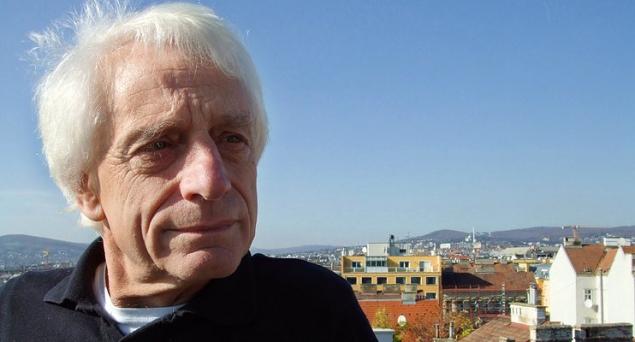
II
What structure do you have a will? I want only what I can do. Makes no sense to say: I want to remove this wall and go through the ceiling. Because the will is the instruction to action, and she suggests that I also can do it.That is, the will realistic. This is the first structure will.
If we are serious about this attitude, then we should not want more than we can — otherwise we will no longer realistic. If I can't work anymore, I don't need to demand it. Free will is also able to leave, to let go.
And this is the reason why I don't do what you want. Because I have no strength, no ability, because I have no tools because I run into walls because I don't know how to do it. Will suggests a realistic look at what is available on the given. So I sometimes don't do what you want.
Also, I don't do something for the reason that I have fear then I push it off. Because I can be hurt, and I'm scared. Because the will is a risk.
If this first structure is not executed, if I do I can't if I have no knowledge if I feel fear, then it bothers me.
The second structure will. Will is a "Yes" in relation to values. This means that I must also see the value. I need something that will attract me. I need to experience good feelings, or I may not want. I have to like the path, otherwise the goal will be far from me.
For example, I want to lose 5 pounds. And I decided to start. 5 pounds less is a good value. But I also have feelings about the way that leads there: I should also like to today I ate less and played sports. If I don't like it, I to this goal won't come. If this feeling I have doesn't, then I won't do what I want. Because the will does not consist solely and only of the mind.
In the end, the values to which I go to will, I should be feeling. And, of course, than depresiunea man, the less he can do what he wants. And here we again find ourselves in the field of mental disorders. In the first dimension of will is fear, various phobias. They prevent a person to follow his will.
The third dimension of the will: to what I want, matched my own. I can see that it was also important to me to suit me personally.
Let's say a person smokes. He thinks that if I smoke something I like. I am 17 years old and I'm a grown man. For a person at this stage is really what corresponds to it. He wants to smoke, he needs it. And when the person becomes more Mature, for the affirmation of cigarette, maybe he no longer needed.
That is, if I feel something is identified, then I can also and want. But if something for me personally is not important, then I will say: Yes, I do, but it really will not make or do with a delay. How we do something, we can identify that for us is important. A diagnosis of structures which lie at the basis of the will. If I can't identify, or if I get around what I find important, once again, I won't do those things, in fact, I would like to do.
And fourth dimension will enable will in a larger context, a larger system of relationships: what I do must be meaningful. Otherwise, I can't do this. If there is no more context. If this does not lead to something where I can see and feel it is valuable. Then I again something will not do.
For a real "want" need 4 structures: 1) if I can, 2) if I like it, 3) if I is consistent and is important to me, if I have the right to do it, if it is permitted, allowed, 4) if I feel that I have to do this because of this is born something good. Then I can do it. Then will well rooted, grounded, and strong she is. Because it relates to reality, because this value is important to me because I find myself in her because I see that this could be something good.
With the will have different problems. Practical problems will we have if we really want something. If we are in our "want to" there is no clarity on the aspect of one or more of these agencies — then we are faced with a dilemma, then I want and do not want.
I would like to mention here two other concepts. We are all aware of such a thing as temptation. Temptation means that the focus of my will changes and moves in the direction of something that I would not have to do. Today, for example, show a good movie, and I need to learn the material — and here, it is tempting. On the table lies the tasty chocolate, but I want to lose weight — again temptation. Consistent direction of my will is rejected from the course.
It is familiar to everyone, and is absolutely normal. Here include the other attractive values which also are important. At a certain intensity the temptation becomes seduction. The temptation is still there will and when there is a temptation, then I begin to act. These two things get stronger. the more in me the need is increasing. If my desire to live fueled by too little if I'm worried a little is good, then the temptations and the temptations become stronger. Because we need the joy of life, in life there should be joy. We must not only work, we must also experience the fun. If that's not enough, the easier it is to seduce me.
III
And in closing, I would like to introduce a method by which we can strengthen the will. For example, in some thing we need to do the homework. And we say: I'll do it tomorrow or today yet. And the next day nothing happens, something happens and we postpone.
What can I do? We can really strengthen the will. If I have some problem, and I can't begin to act,then I can sit down and ask yourself: what values do I say Yes? Why is it good if I write this work? What are the benefits involved? I must clearly see what is good. In General terms these values are known, at least head to understand them.
And here the second step is risky, but I begin to ask themselves "what are the advantages if I do?". What will I get if I don't write this work? Then I wouldn't have this problem, my life would be more fun. And it may well be that I find so much of value that happens to me, if I not write that I'm really not going to write it.
As a physician, I worked a lot with patients who wanted to quit Smoking. Each of them I asked this question. The answer was: "do You want to demotivate me? When you ask me what I win if I quit, then I have so many ideas!" I replied, "Yes, this is the reason why we sit here". And had patients who, after this second step said: "it became clear to Me, I will continue to smoke." Does that mean I'm a bad doctor? I move the patient in the direction that they quit Smoking, and I have to motivate them to quit — and I move them in the opposite direction. But it's a small matter, if people say: "I will continue to smoke" than he is to think three weeks, and then will still continue to smoke. Because there is no effort to throw. If the values that it implements due to Smoking, attractive to him, he can't throw.
That is the reality. The will does not follow reason. The value need to feel, otherwise nothing happens.
Then follows the third step — and it is the core of this method. For example, in the second step, someone will decide: Yes, it will be more valuable if I write this work. Then we are talking about how to enhance the value of what you will do, make it your own. We as therapists may ask: have you ever experienced this — you write something? Maybe this man had once written something and felt a sense of joy? It is possible to give an example and ask: what was so good? In my practice there were many examples of this situation. Many have told me about writing on the negative side: "the feeling that behind me there is a Professor watching what I write and says: "Oh, my God!"". And then people are demotivated. Then you need to separate the book from the Professor and writing for myself.
That is, the core is the value in question. You need to feel it, as if to be inside and to correlate with previous experience. And look for values in a specific mode of action.
And the fourth step: and for what it is, in fact, okay? How does that make sense? What am I even doing this? What I'm learning? And the specific situation goes into a larger context, on a broader horizon. Then I can worry about strengthening their own motivation — or not survive.
I had a friend who after a long work on a dissertation, suddenly noticed that it makes no sense to write this thesis. He was a teacher, and found that there was no interest in pedagogy-he had just wanted to get an academic title. But why to sacrifice such amount of time for something not make sense? Therefore, it is internally unconsciously blocked the work on the dissertation. His feelings was smarter than his mind.
What is there to take practical steps? You can not expect that you can just quickly write. But you can start with a single paragraph. You can take something from some book. So we see that we can build our life. We see, it is important to take your life into your own hands. The problems associated with the will, we too can to do something. Namely, to look at the structure of will. Because if the structures are not met, then the will nothing will work. Also we can regard a task ask yourself the open question: what speaks against it? should I really be doing this? or must free yourself, leave this task? In the context of "leave" may be present "want." Until I bring myself to do it, I will call a paradoxical reaction.
People are so free that we want ourselves to remain free. Thank you for your attention." published
@Alfred Laengle, prepared Anastasia Khramutichev
P. S. And remember, just changing your mind — together we change the world! ©
Source: //www.matrony.ru/alfrid-lengle-pochemu-ya-ne-delayu-to-chto-hochu/

"The theme of the will is the subject that we deal with every day. We don't even leave from this topic. Every person who is here, is here because he wants to be here. No one came here involuntarily. And what would we do during the day, this is due to our will. Do we sleep whether we sleep, whether we're on some conversation, we decide whether a conflict, we do so only if we have decided in favor of this and we have the will to do it.
Maybe we are not even aware of this fact, because we don't say so often "I want" and bring it in such expressions: "I would like", "I would have done". Because the phrase "I want" translates to something very important. And will is really power. If I don't want to do it. No one has the power over me to change my will, only myself. In most cases we don't even realize it, but intuitively we have a sense that this is what this will. So we're talking more softly, "I wish" "I wish" or simply, "I'll go". "I'll go to this report" — this is the solution. To complete this idea, which was a kind of introduction, say:often we don't even realize that every minute you want something.
I would like to divide my report into three parts: in the first part describe the phenomenon of will, the second part to talk about the structure of the will, and in the third part briefly mention the method of reinforcement of will.
I
Will every day present in our life. Who is the one person who wants? It's me. Only I manage will. Will is something completely my own. I identify themselves with the will. If I want something, I know it's me. The will represents the autonomy of a person.
Autonomy means that I set for myself the law. And the will at our disposal is itself a determination, through will I will determine what I will do as the next step. And it already describes the task will. Will is the ability of a person to give himself a job. For example, I want to keep talking.
Thanks will, I release your inner strength for some action. I invest some power and give it time.That is, the will is an instruction to perform an action that I give to myself. In fact, that's all. I give myself the order to do something. And since I want it, I experience myself as free. If any order I give my father or Professor, it is the job of a different kind. Then I already no longer free, if you follow this. Unless I joined their mission to their will and say, "Yes, I'll do it."
In our lives the will has absolutely pragmatic function — to come to action. Will is the bridge between the centre of the team, in me and act. And it is bound to I — because I have only my will.To bring this will into movement is the task of motivation. That is, the will is very closely connected with motivation.
Motivation at its core means nothing, as the Ghost will move. I can motivate your child to homework. If I tell him why it's important, or promise him a chocolate. To motivate means to bring man to what he wanted to do himself. Employee, friend, colleague, child or yourself.How can I self motivate, for example, to prepare for the exam?In principle, the same means, how do I motivate the child. Can think of why this is important. And you can promise yourself a chocolate bar as a reward.
To recap. First, we saw that the will is a job to do something that man gives himself. Secondly, the author will is myself. There is only one my personal will, in me. "Wants" is none other like me. Thirdly, the will is the center of motivation. To motivate means to bring the will into motion.
And it puts the person before finding a solution. We have some hypothesis, and we are faced with the question: "do you Want me or not?". I have to make a decision — because I have freedom. Will is my freedom. If I want something, I am free, I decide, I myself fix something. If I want something myself, I'm not forced, I don't have to.
This is the other pole of will — lack of freedom, forced. To be forced by a greater power — the state, police, professors, parents, a partner who will punish me if anything, or because it may have bad consequences if I don't do something that the other wants. Also, I can cause the psychopathology or mental disorders. This is just a characteristic of mental illness: we can't do what you want. Because I have too much to fear. Because I'm depressed, and I have no power. Because I depend. And then again and again I have to do what you don't want to do. Mental disorders involve a failure to follow his will. I want to get up, to do some business, but I have no desire, so I feel bad, I'm so depressed. I have remorse that I did not get up again. Thus, depressed people can't follow what he thinks is right. Or anxious person can't go to the exam, although wants.
In the will we find the solution and implement our freedom. This means that if I want something, and it's a real will, I have a special feeling — I feel free. I feel like I'm not being forced, and it fits me. It's me again, which itself implements. That is, if I want something, I am not a machine, a robot.
The will is the realization of human freedom. And this freedom is so deep and so personal that we can't get it to give to someone. We cannot stop being free. We need to be free. It's a paradox. This is indicated by existential philosophy. We are free to a certain extent. But we are not free to not want. We should want. We need to make decisions. We have to do something.
If I'm sitting in front of the TV, I'm tired and fall asleep, I have to make a decision whether to continue to sit because I'm tired (this is also a solution). But if I can't make the decision, it also has a solution (I say that now I can not make a decision, and do not take any decision). That is, we make decisions, we always have will. We are always free because we can't stop to be free, as Sartre formulated it.
And because this freedom is located at a great depth, in the depth of our essence, the will is very strong. Where there's a will there's a way. If I really want something I will find a way. People sometimes say: I don't know how I to do something. Then these people have a weak will. They do not truly want. If you really want something, go thousands of kilometers and becomes the founder of a University in Moscow, Lomonosov. If I don't really want no one can force my will. My will is completely my own business.
I remember one depressed patient, who suffered from their relationship. She always had to do something that she was forced to do her husband. For example, the husband said: "Today I will go to your car, because I ran out of gas". Then she was forced to go to the gas station and it was late for work. A similar situation was repeated again and again. There were many such examples.
I asked her: "why not say "no"?". She said, "because of the relationship. I ask further:
— But this relationship does not improve? You want to give him the keys?
— I'm not. But he wants to.
—Well, he wants. What do you want?
In therapy, counselling is a very important step: to see what is my own will.
We talked a bit about that, and she said:
Actually, I don't want to give him the keys, I'm not a maid for him.
And now, in the relationship occurs the revolution.
— But, "she says," I have no chance, because if I don't give him the keys, he will come and take them.
But before you can take the keys into their own hands?
But then he takes the keys out of my hands!
But if you don't want, you can hold them in your hand.
— Then he will use force.
— Maybe so, he is stronger. But this does not mean that you want to give the keys. He can't change your will. It can only be done by you. Of course, it can worsen the situation so, what do you say: enough is enough. All this causes me so much pain that I no longer want to hold on to their will. It would be better if I give him the keys.
— This means that it will be enforced!
— Yes, he forced you. But will you change yourself.
It is important that we realize this: that the will belongs only to me and it can only change me, no one else. Because the will is freedom. And we, the people, there are three forms of freedom, and they all play a role in connection with the will.
English philosopher David Hume wrote that we have freedom of action (for example, freedom to come here or come home, it is a freedom directed outwards).
There is another freedom that is above the external forces, is freedom of choice, freedom of decision. I determine what I want and why I want it. Because for me there is value, because it corresponds to me, and probably my conscience tells me that it's right then I make a decision in favor of something, for example, to come here. It is preceded by the freedom of decision. I found out what the subject thought it would be interesting, and I have a certain amount of time, and many opportunities to spend time I choose one. I decide, I give myself a task and realize my freedom of choice freedom of action, come here.
The third freedom — freedom of the entity, is an intimate freedom. This feeling of inner consent. The decision to say "Yes." "Yes" — where is it? This is not something rational, it comes from some depths inside of me. This decision is associated with freedom fact, so strong that it can make the nature of the obligation.
When Martin Luther accused the publication of his theses, he said, "here I stand I can do no other". Of course, he could anyway — he was a smart man. But it would be in such a degree contrary to his nature, he had the feeling that it's not him, if he would deny it, will refuse. These internal attitudes and beliefs are an expression of underlying human freedom. And in the form of the internal agreement contained in any will.
The question of will can be tricky. We talked about the fact that the will is freedom, and that freedom is power. But at the same time will is sometimes seems forced. Luther could not be otherwise. And freedom too, have a compulsion: I have to make a decision. I can't dance at two weddings. I can't simultaneously be both here and at home. That is, I am forced to freedom. Maybe tonight is not such a big problem. But what you have to do will, if I simultaneously love two women (or two men) and, moreover, equally strong? I have to make a decision. Some time I can keep it a secret, to hide it, to avoid the need to make a decision, but such decisions can be very difficult. What decision should I make if those and other relationships are very valuable? It can make you sick, it can break your heart. This is the meal of choice.
All of us are familiar with in the more simple situations: if I have fish or meat? But it's not so tragic. Today can eat fish and meat tomorrow. But there are situations one of a kind.
That is, the freedom of the will is also bound by compulsion, a necessity — even in the freedom of action. If I wanted to come here today, then I have to fulfill all the conditions, so I could come here: to go by metro or by car, to walk. I have to do something to arrive from point A to point B. To implement will, I have to meet these conditions. And where is the freedom? This is a typical human freedom: I'm doing something, and I constricting "corset" conditions.
But maybe we should define what is "will"? The will is the solution. Namely, the decision to go on some value you have chosen. I choose between the different values this evening and choose one thing and implement it, making a decision. I dare say this is my last "Yes." Say "Yes" to this value.
Can even shorter to formulate a definition of will. Will is my inner "Yes" in relation to some values. I want to read the book. The book is valuable for me because it is a good novel or textbook, which I need to prepare for the exam. I say Yes to this book. Or meeting with a friend. I see some value. If I say Yes, then I am also willing to make some effort to see it. I'm going to him.
With this "Yes" the value is related some investment, a contribution, the willingness to pay for it, to do something, become active. If I want, I go in that direction. It's a big difference compared to just desire. It is important to hold the distinction. Desire is the same value. I wish a lot of happiness, health, to meet a friend, but wishing does not contain the readiness something to do — because I remain passive, I expect it will come. I wish my friend called me, and I'm waiting. Many things I just have to wait — I can't do anything. I wish you or for a speedy recovery. Everything has been done, what could be done, there is only the value recovery. I tell myself and other that consider it as a value and hope that it will happen. But it is not the will because the will is to give yourself an assignment of some actions.
For will always have a good reason. I had a good reason to come here. And what is the basis or the reason to come here? It just is value. Because I see this as something good and valuable. And for me, this is the reason, consent to go for it, maybe to take the risk. Maybe it turns out that this is a very boring report, and then I wasted this evening. To do something with the will always involves some risk. So will include existential act, because I am taking the risk.
Against the will of the common two points of misunderstanding.The will is often confused with logic and rationality — in the sense that I can want only what is reasonable. Example: after four years of training is reasonable to study a fifth year and finish her studies. It is impossible to want to stop training! It's so irrational, so stupid. Maybe. But the will is not something logical, pragmatic. The will arises from mysterious depths. Will have much more freedom than in the rational beginning.
And the second point of misunderstanding: it may seem that you can set in motion will, if you give yourself task to want. But from whence comes my way? It does not come from my "want." I can't "want". I also may not want to believe, I can't want to love, I can't want to hope. Why? Because the will is an instruction to do something. But faith or love is not action. I do not do it. This is something that occurs in me. I can't help it if I love. We don't even know what soil is falling love. We can't control, we can't "make" — so don't blame us if we love or do not love.
In the case of the will is something like that. What I want, grows somewhere in me. This is not something where I can give myself an assignment.It grows out of me from the depths. The more you will connect with this great depth, the more I experience his will as something that corresponds to me, the more I am free. And with the will comes responsibility. If the will resonates with me and I live by being responsible. And only then will I truly be free. German philosopher and writer Matthias Claudius once said: "Man is free if he can want what he has".
If this is so, then the will is connected to "leave". I should be free to leave my feelings so that I could feel that I'm growing. Leo Tolstoy once said, "Happiness lies not in the fact that you could do what you want...". But freedom means that I can do what I want? So. I can follow his will, and then I'm free. But Tolstoy says about happiness, not about the will: "...and happiness is to always want what you're doing." In other words, for you have always been internal agreement in relation to what you do. What Tolstoy describes, is an existential will. How happiness I am experiencing what I do if I experience this inner response, an inner response if I say to this is "Yes". And an inner consent, I cannot "make" — I can only listen to yourself.

II
What structure do you have a will? I want only what I can do. Makes no sense to say: I want to remove this wall and go through the ceiling. Because the will is the instruction to action, and she suggests that I also can do it.That is, the will realistic. This is the first structure will.
If we are serious about this attitude, then we should not want more than we can — otherwise we will no longer realistic. If I can't work anymore, I don't need to demand it. Free will is also able to leave, to let go.
And this is the reason why I don't do what you want. Because I have no strength, no ability, because I have no tools because I run into walls because I don't know how to do it. Will suggests a realistic look at what is available on the given. So I sometimes don't do what you want.
Also, I don't do something for the reason that I have fear then I push it off. Because I can be hurt, and I'm scared. Because the will is a risk.
If this first structure is not executed, if I do I can't if I have no knowledge if I feel fear, then it bothers me.
The second structure will. Will is a "Yes" in relation to values. This means that I must also see the value. I need something that will attract me. I need to experience good feelings, or I may not want. I have to like the path, otherwise the goal will be far from me.
For example, I want to lose 5 pounds. And I decided to start. 5 pounds less is a good value. But I also have feelings about the way that leads there: I should also like to today I ate less and played sports. If I don't like it, I to this goal won't come. If this feeling I have doesn't, then I won't do what I want. Because the will does not consist solely and only of the mind.
In the end, the values to which I go to will, I should be feeling. And, of course, than depresiunea man, the less he can do what he wants. And here we again find ourselves in the field of mental disorders. In the first dimension of will is fear, various phobias. They prevent a person to follow his will.
The third dimension of the will: to what I want, matched my own. I can see that it was also important to me to suit me personally.
Let's say a person smokes. He thinks that if I smoke something I like. I am 17 years old and I'm a grown man. For a person at this stage is really what corresponds to it. He wants to smoke, he needs it. And when the person becomes more Mature, for the affirmation of cigarette, maybe he no longer needed.
That is, if I feel something is identified, then I can also and want. But if something for me personally is not important, then I will say: Yes, I do, but it really will not make or do with a delay. How we do something, we can identify that for us is important. A diagnosis of structures which lie at the basis of the will. If I can't identify, or if I get around what I find important, once again, I won't do those things, in fact, I would like to do.
And fourth dimension will enable will in a larger context, a larger system of relationships: what I do must be meaningful. Otherwise, I can't do this. If there is no more context. If this does not lead to something where I can see and feel it is valuable. Then I again something will not do.
For a real "want" need 4 structures: 1) if I can, 2) if I like it, 3) if I is consistent and is important to me, if I have the right to do it, if it is permitted, allowed, 4) if I feel that I have to do this because of this is born something good. Then I can do it. Then will well rooted, grounded, and strong she is. Because it relates to reality, because this value is important to me because I find myself in her because I see that this could be something good.
With the will have different problems. Practical problems will we have if we really want something. If we are in our "want to" there is no clarity on the aspect of one or more of these agencies — then we are faced with a dilemma, then I want and do not want.
I would like to mention here two other concepts. We are all aware of such a thing as temptation. Temptation means that the focus of my will changes and moves in the direction of something that I would not have to do. Today, for example, show a good movie, and I need to learn the material — and here, it is tempting. On the table lies the tasty chocolate, but I want to lose weight — again temptation. Consistent direction of my will is rejected from the course.
It is familiar to everyone, and is absolutely normal. Here include the other attractive values which also are important. At a certain intensity the temptation becomes seduction. The temptation is still there will and when there is a temptation, then I begin to act. These two things get stronger. the more in me the need is increasing. If my desire to live fueled by too little if I'm worried a little is good, then the temptations and the temptations become stronger. Because we need the joy of life, in life there should be joy. We must not only work, we must also experience the fun. If that's not enough, the easier it is to seduce me.
III
And in closing, I would like to introduce a method by which we can strengthen the will. For example, in some thing we need to do the homework. And we say: I'll do it tomorrow or today yet. And the next day nothing happens, something happens and we postpone.
What can I do? We can really strengthen the will. If I have some problem, and I can't begin to act,then I can sit down and ask yourself: what values do I say Yes? Why is it good if I write this work? What are the benefits involved? I must clearly see what is good. In General terms these values are known, at least head to understand them.
And here the second step is risky, but I begin to ask themselves "what are the advantages if I do?". What will I get if I don't write this work? Then I wouldn't have this problem, my life would be more fun. And it may well be that I find so much of value that happens to me, if I not write that I'm really not going to write it.
As a physician, I worked a lot with patients who wanted to quit Smoking. Each of them I asked this question. The answer was: "do You want to demotivate me? When you ask me what I win if I quit, then I have so many ideas!" I replied, "Yes, this is the reason why we sit here". And had patients who, after this second step said: "it became clear to Me, I will continue to smoke." Does that mean I'm a bad doctor? I move the patient in the direction that they quit Smoking, and I have to motivate them to quit — and I move them in the opposite direction. But it's a small matter, if people say: "I will continue to smoke" than he is to think three weeks, and then will still continue to smoke. Because there is no effort to throw. If the values that it implements due to Smoking, attractive to him, he can't throw.
That is the reality. The will does not follow reason. The value need to feel, otherwise nothing happens.
Then follows the third step — and it is the core of this method. For example, in the second step, someone will decide: Yes, it will be more valuable if I write this work. Then we are talking about how to enhance the value of what you will do, make it your own. We as therapists may ask: have you ever experienced this — you write something? Maybe this man had once written something and felt a sense of joy? It is possible to give an example and ask: what was so good? In my practice there were many examples of this situation. Many have told me about writing on the negative side: "the feeling that behind me there is a Professor watching what I write and says: "Oh, my God!"". And then people are demotivated. Then you need to separate the book from the Professor and writing for myself.
That is, the core is the value in question. You need to feel it, as if to be inside and to correlate with previous experience. And look for values in a specific mode of action.
And the fourth step: and for what it is, in fact, okay? How does that make sense? What am I even doing this? What I'm learning? And the specific situation goes into a larger context, on a broader horizon. Then I can worry about strengthening their own motivation — or not survive.
I had a friend who after a long work on a dissertation, suddenly noticed that it makes no sense to write this thesis. He was a teacher, and found that there was no interest in pedagogy-he had just wanted to get an academic title. But why to sacrifice such amount of time for something not make sense? Therefore, it is internally unconsciously blocked the work on the dissertation. His feelings was smarter than his mind.
What is there to take practical steps? You can not expect that you can just quickly write. But you can start with a single paragraph. You can take something from some book. So we see that we can build our life. We see, it is important to take your life into your own hands. The problems associated with the will, we too can to do something. Namely, to look at the structure of will. Because if the structures are not met, then the will nothing will work. Also we can regard a task ask yourself the open question: what speaks against it? should I really be doing this? or must free yourself, leave this task? In the context of "leave" may be present "want." Until I bring myself to do it, I will call a paradoxical reaction.
People are so free that we want ourselves to remain free. Thank you for your attention." published
@Alfred Laengle, prepared Anastasia Khramutichev
P. S. And remember, just changing your mind — together we change the world! ©
Source: //www.matrony.ru/alfrid-lengle-pochemu-ya-ne-delayu-to-chto-hochu/


